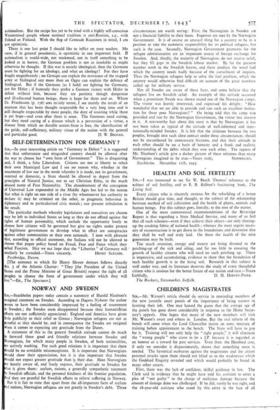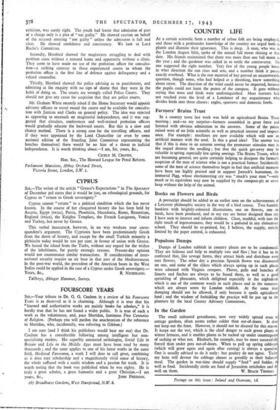CHILDREN'S MAGISTRATES
Sta,—Mr. Watson's article should do service in reminding members of the new juvenile court panels of the importance of being earnest in learning their job. One may hazard the guess that the average age of the panels has gone down considerably in response to the Home Secre- tary's appeals. One hopes that many of the new members will visit Mr. Watson's court and others in London. But the real reform of the bench will come when the Lord Chancellor insists on some measure of training before appointment to the bench. The State will have to pay for it. Training will not only help the "right people," it will eliminate the "wrong people" who crave to be a J.P. because it is regarded as an honour or a reward for past services. Even then, the Hereford case, if only we consider it dispassionately, shows that something more is needed. The hysterical outbursts against the magistrates and the unjust personal attacks upon them should not blind us to the weaknesses which the Goddard Enquiry revealed and which would probably be found in many other courts.
First, there was the lack of confident, skilful guidance in law. The Clerk said in evidence that he might have told his assistant to enter a plea of "not guilty" to the charge of malicious damage because the amount of damage done was challenged. If he did, surely he was right, and the 18-year-old assistant who stood by this entry in the face of all criticism, was surely right. The youth had learnt that admission of part of a charge only is a plea of "not guilty." He showed caution on behalf of the accused entering "not guilty" unless the admission is full and clear. He showed confidence and consistency. We look to Lord Roche's Committee.
Secondly, Hereford showed the magistrates struggling to deal with problem cases without a remand home and apparently without a clinic. They seem to have made no use of the probation officer for consulta- tion—a striking contrast to those experienced courts to whom the probation officer is the first line of defence against delinquency and a valued counsellor.
Thirdly, Hereford showed the police advising as to punishment, and admitting at the enquiry with no sign of shame that they were in the habit of doing so. The courts are wrongly called Police Courts. They should not give any cause for suspicion that they are police courts.
Mr. Graham White recently asked if the Home Secretary would appoint advisory officers to travel round the courts and be available for consulta- tion with Justices and Clerks on general policy. The idea was rejected as appearing to encroach on magisterial independence, and it was sug- gested that circulars, conferences and well-trained probation officers would gradually educate the backward courts. But this is a slow and chancy method. There is a strong case for the travelling officers, and if they were appointed by the Lord Chancellor (or even by some national edition of the Standing joint Committee representing the benches themselves) there would be no hint of a threat to judicial independence. It is worth thinking about.—I am, Sir, yours, &c.,
CICELY M. CRAVEN,
Hon. Sec., The Howard League for Penal Reform.
Parliament Mansions, Abbey Orchard Street, Victoria Street, London, S.W. i.



























 Previous page
Previous page